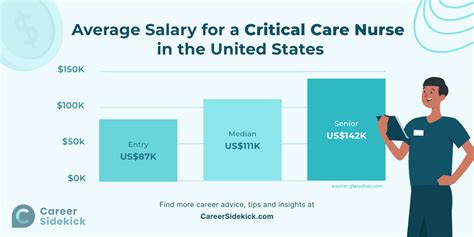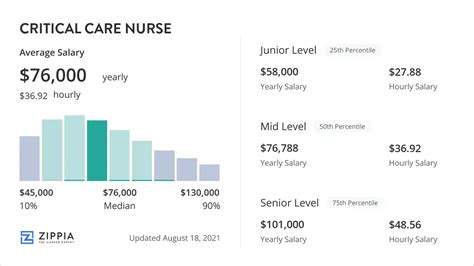Intro
Discover the average Critical Care RN salary ranges and factors influencing compensation. Learn about the highest-paying locations, industries, and experience levels for Critical Care Registered Nurses. Get insights into salary variations, job outlook, and growth opportunities in this comprehensive guide to Critical Care RN salaries and career advancement.
As the healthcare industry continues to evolve, the demand for skilled and compassionate critical care nurses has never been higher. These dedicated professionals play a vital role in ensuring the well-being of patients who are critically ill or injured, requiring close monitoring and life-sustaining interventions. One of the most significant benefits of pursuing a career as a critical care registered nurse (RN) is the competitive salary range. In this comprehensive guide, we will delve into the world of critical care RN salaries, exploring factors that influence compensation, average salary ranges, and tips for maximizing earning potential.

Factors Influencing Critical Care RN Salaries
Several factors contribute to the variation in critical care RN salaries. Understanding these elements can help you navigate the job market and negotiate a fair salary.
Location
Geographical location plays a significant role in determining critical care RN salaries. Cities with a high cost of living, such as San Francisco or New York, tend to offer higher salaries to compensate for the increased expenses. Conversely, areas with a lower cost of living, such as rural towns, may offer lower salaries.
Employer Type
The type of employer can also impact salary. For example, critical care RNs working in academic medical centers or research institutions may earn higher salaries than those working in community hospitals or long-term care facilities.
Level of Experience
As with most professions, experience is a significant factor in determining salary. Critical care RNs with more years of experience can expect to earn higher salaries than their less-experienced counterparts.
Education and Certifications
Advanced education and certifications can also influence salary. Critical care RNs with a Bachelor of Science in Nursing (BSN) or a Master of Science in Nursing (MSN) may earn higher salaries than those with an Associate Degree in Nursing (ADN). Additionally, certifications like the Certified Critical Care Registered Nurse (CCRN) or the Certified Neuroscience Registered Nurse (CNRN) can demonstrate expertise and commitment to the field, leading to higher salary potential.
Shift Differentials and Overtime
Critical care RNs often work non-traditional shifts, including nights, weekends, and holidays. Shift differentials and overtime pay can significantly impact take-home pay.
Average Critical Care RN Salary Ranges
According to the Bureau of Labor Statistics (BLS), the median annual salary for registered nurses in the United States was $76,840 in May 2020. However, critical care RNs can expect to earn higher salaries due to their specialized skills and high level of responsibility.
Here are some average salary ranges for critical care RNs in the United States:
- Entry-level (0-2 years of experience): $65,000 - $80,000 per year
- Mid-level (2-5 years of experience): $75,000 - $95,000 per year
- Experienced (5-10 years of experience): $85,000 - $115,000 per year
- Advanced (10+ years of experience): $100,000 - $130,000 per year

Maximizing Earning Potential
While salary ranges can provide a general idea of what to expect, there are several strategies to maximize earning potential as a critical care RN:
Pursue Advanced Education and Certifications
Investing in advanced education and certifications can demonstrate expertise and commitment to the field, leading to higher salary potential.
Gain Experience and Build a Strong Reputation
Building a strong reputation as a skilled and compassionate critical care RN can lead to higher salary offers and greater job security.
Consider Non-Traditional Shifts and Overtime
Working non-traditional shifts and taking on overtime can significantly impact take-home pay.
Negotiate Salary and Benefits
When offered a job, don't be afraid to negotiate salary and benefits. Research the market and make a strong case for your desired compensation package.
Join Professional Organizations and Networking Groups
Joining professional organizations and networking groups can provide access to job opportunities, continuing education, and salary data.
Conclusion
As a critical care RN, you play a vital role in ensuring the well-being of patients who are critically ill or injured. By understanding the factors that influence salary, average salary ranges, and strategies for maximizing earning potential, you can navigate the job market with confidence. Remember to stay focused on your goals, pursue advanced education and certifications, and build a strong reputation as a skilled and compassionate critical care RN.

We hope this comprehensive guide has provided valuable insights into the world of critical care RN salaries. Share your thoughts and experiences in the comments below!
What is the average salary for a critical care RN in the United States?
+According to the Bureau of Labor Statistics (BLS), the median annual salary for registered nurses in the United States was $76,840 in May 2020. However, critical care RNs can expect to earn higher salaries due to their specialized skills and high level of responsibility.
What factors influence critical care RN salaries?
+Several factors contribute to the variation in critical care RN salaries, including location, employer type, level of experience, education and certifications, and shift differentials and overtime.
How can I maximize my earning potential as a critical care RN?
+To maximize earning potential, consider pursuing advanced education and certifications, gaining experience and building a strong reputation, working non-traditional shifts and taking on overtime, negotiating salary and benefits, and joining professional organizations and networking groups.
